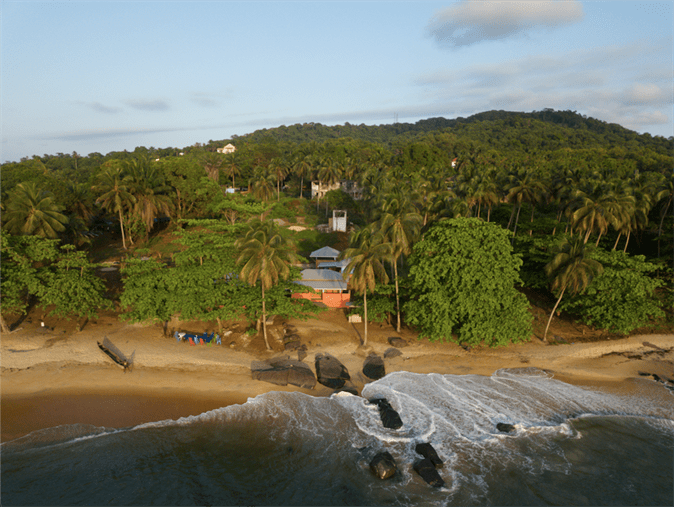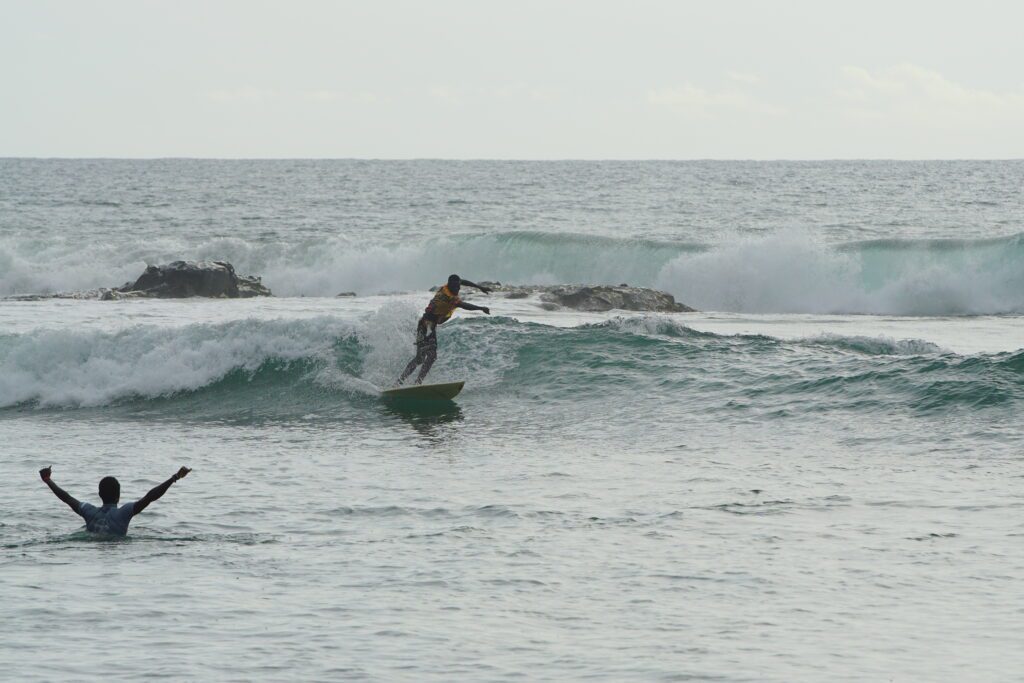A Case For Surf Tourism As “Not (Always) Guilty”
“Liberia Is A Place For Child Surfers, Not Child Soldiers Anymore”
“You can compare this wave in Liberia to J-Bay or other world-class waves. I just don’t know why people don’t know about it.”
People don’t know about it because few have ventured there, mostly due to fear.
From 1989-2013 two separate civil wars tore Liberia apart, leaving roughly 250,000 people — or 1 in 17 Liberians — dead. Children were forcibly recruited, drugged, and handed assault rifles to join in the violence. And then in 2014, Ebola ripped through the nation, infecting nearly 11,000 people. Liberia is also consistently ranked among the world’s top 10 poorest countries.

But, members of Liberia’s first surf club, located in the wave-wealthy town of Robertsport don’t want to be as F. Scott Fitzgerald wrote, “borne back ceaselessly into the past.” Now in an epoch of peace, with a growing economy and more educational opportunities, a bright light has begun to flicker on the horizon.
With five left point breaks within walking distance of the club, the region resembles a flipped Salina Cruz (any clip of the main point is enough to turn a goofy-footer on). But in the past, there hasn’t been an infrastructure to accommodate visitors. The local surfers — made up of mostly children — also did not have access to new boards, wax, leashes, ding repair kits, etc.
That’s where you came in.
Last year, Stab collaborated with French professional surfers Damien Castera and Arthur Bourbon to show their film Water Get No Enemy on Premium for a period of two weeks. The film tells Liberia’s surf story, and we launched it at a strategic time. Arthur had just created a GoFundMe to help construct the surf club we’ve been talking about. Stab donated to the fund and encouraged our audience to do the same.
Spoiler alert: It worked.

“We reached our goal to build the clubhouse and the restaurant,” Arthur told me. “The locals now have a central place to congregate. They are also working the restaurant, which means you can now go have a nice meal and a beer in front of the wave. And they are giving surf lessons and doing ding repair to bring extra money in.”
But the work isn’t done yet. Arthur explained that the goal is now to establish accommodations for visitors. “The project has phases. They just installed solar panels for electricity and the next step is creating a sort of ‘glamping’ site. In the future, there will be more guest houses, as there are now only two or three guest houses in the area.”

Now, this isn’t another white-guy-pats-himself-on-the-back situation. Arthur was adamant that, “This is the locals’ story. So many people know about the bad stuff but the local surfers want to look to the future. They want to paint a brighter picture.”
And to paint that picture, there needs to be brushes. Last month, Stab also partnered with Provide The Slide, a Swiss NGO that gathers surfboards to be shipped to Senegal, Sierra Leone, Gambia, Ghana, Ivory Coast, and Liberia. To date, they have delivered over 350 boards. I phoned up Chris Klein, who runs the operation, to get a report:

“We are getting ready to send the latest shipment as we speak. This load has 60-70 boards with fins, wax, tailpads, leashes, and fin keys. The goal is not simply to send boards. We have partnerships with prominent members of each surf community that decide amongst themselves how best to fairly distribute boards.”
Chris mentioned that the level of surfing in Liberia has already increased significantly, “When we first arrived, kids were surfing on boards with just one side fin. Now the young surfers are surfing better than the older generation. They have their own styles and are trying 360’s and airs after seeing guys like Arthur do them when he visited.”
So, even the air reverse can’t escape globalization.

“Surfing also gives these kids an identity and a community,” Chris added. Liberia is a gateway for drugs arriving to European countries, with gangs controlling the trafficking. Surfing is an excuse for the younger generation to stay away from these gangs and focus on their craft. The Annual Liberian Surf Championships will reach the milestone of its 10th anniversary in May.

Chris also connected me with Kent Bubbs, a Canadian who lives 10 months of the year in Liberia with his wife, Landis Wyatt. Together they run a charitable organization called Universal Outreach. One of the organization’s objectives is to bolster surf tourism in the area. They work alongside Robertsport Surf Club. I chatted with Kent over the phone from his home in Monrovia:
“Today, the club is stronger than ever. It’s an official, registered organization with the Liberian government. There are around 65 members of the club right now and a Board made up of three prominent local surfers and four community elders — the town Chief acting as Chair.”
Kent continued, “The organization is now working on providing scholarships for surfers looking to advance their education. And we just secured a new boat, a large canoe, that will be used for fishing and surf charters. Eventually the club will be completely funded through revenue generated by club members.”

Finally, after nearly 10 years of deliberation, the Board was able to purchase the beachfront property that the club is standing on. Kent was ecstatic about this. “This way the locals will never get pushed out or pushed inland by bigger, wealthier investment like we see in other developing areas with good surf.”
This is the formula that seems to be the modus operandi for exploiting promising surf regions: foreign surfers discover it, photos get leaked, foreign capital slowly creeps in and swoops up the best land, swanky development begins, cafés with weird light fixtures and cute sayings on the wall emerge, and if things really go well, a Lululemon appears.
This happens so slowly it’s at first imperceptible, but then inevitable. Go to any far-flung surf destination that was explored in the 70s and 80s. Where do the local people live now? Almost always a few blocks — sometimes miles — inland. We’ve seen it in Bali, Puerto Escondido, Costa Rica, and even Byron Bay. The rise of “digital nomads” who can afford to rent out this oceanfront property accelerates the phenomena.

Now, sometimes this is great for the local people and their economy. And sometimes it’s not. But since this is “the locals’ story” I wanted to speak to someone who grew up in Robertsport to make real sense of it. I was referred to Brahema Gross, born and raised in the region, and he gave me his perspective on what’s happening in his own community. Brahema said:
“We appreciate this so much. It means a lot to us youth. It’s bringing jobs to the youth around here. Now we have ding repair, surf lessons, boat repair, delicious Liberian food and drinks, and you can even go see the lakes and mountains around here. We’ve even got secret waves around here that the world hasn’t seen.”
“The organization Waves For Change also provides coaching to the kids around here about building self-esteem, developing positive habits and planning for the future, and avoiding drugs and alcoholism. And Provide The Slide is giving us all the boards and materials we need. I want to thank them.”
Brahema also called me out. “Now, don’t just write this up then never come here (laughs). We want to meet you. We need more tourists. Come meet the local surfers. We have the services.”

From all accounts Liberia is poised and prepared to handle growth. In this day and age, with a knowledge of the history of good and bad that has occurred with surf tourism, emerging nations like Liberia can benefit greatly from visitors due to an intentional, planned development. Time will tell if it reaches the Lululemon echelon.
We will also soon see Liberia join the ISA (International Surfing Association), making it the fourth African country in the competition, alongside Algeria, Senegal, and South Africa. The next step is getting ISA judges to the country and deciding the team through the Liberia National Championships. Liberia will then be able to vie for a spot in the 2024 Paris Olympic Games for surfing.

To have a successful Liberian surf trip, Kent recommends planning ahead of time by arranging a ride from the airport in Monrovia (Liberia’s capital) to the Robertsport surf club. He said to look online for local “guest houses” like Phillip’s Guest House, for example. He also told us that life in the small fishing village of Robertsport is as peaceful as it gets. Brahema says the best time of year for waves is late summer to fall.
To get a taste of how good this wave really is (I looked at plane tickets after seeing it), check out the final section of Water Get No Enemy and Chris Malloy’s film, Sliding Liberia. You can also help the club continue to expand by supporting the following efforts:
Robertsport Surf Club GoFundMe:
https://www.gofundme.com/f/liberiasurfclub?utm_campaign=p_cp_url&utm_medium=os&utm_source=customer
Provide The Slide:
Waves For Change:


















Comments
Comments are a Stab Premium feature. Gotta join to talk shop.
Already a member? Sign In
Want to join? Sign Up